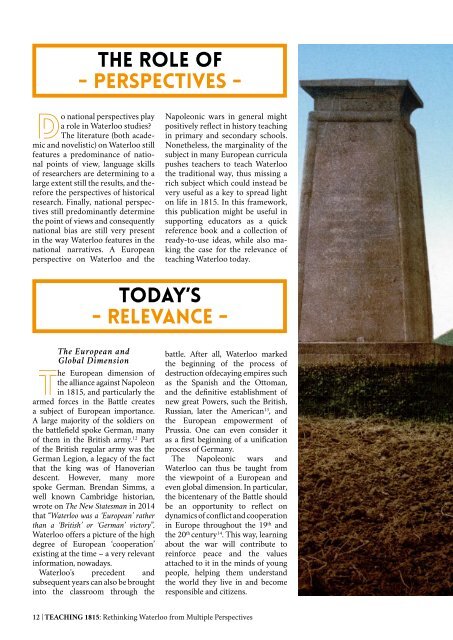Teaching 1815 - Rethinking Waterloo from multiple perspectives (Francesco Scatigna, EUROCLIO)
Teaching 1815 - Rethinking Waterloo from multiple perspectives (Francesco Scatigna, EUROCLIO)
Teaching 1815 - Rethinking Waterloo from multiple perspectives (Francesco Scatigna, EUROCLIO)
You also want an ePaper? Increase the reach of your titles
YUMPU automatically turns print PDFs into web optimized ePapers that Google loves.
the role of<br />
- <strong>perspectives</strong> -<br />
Do national <strong>perspectives</strong> play<br />
a role in <strong>Waterloo</strong> studies?<br />
The literature (both academic<br />
and novelistic) on <strong>Waterloo</strong> still<br />
features a predominance of national<br />
points of view, language skills<br />
of researchers are determining to a<br />
large extent still the results, and therefore<br />
the <strong>perspectives</strong> of historical<br />
research. Finally, national <strong>perspectives</strong><br />
still predominantly determine<br />
the point of views and consequently<br />
national bias are still very present<br />
in the way <strong>Waterloo</strong> features in the<br />
national narratives. A European<br />
perspective on <strong>Waterloo</strong> and the<br />
Napoleonic wars in general might<br />
positively reflect in history teaching<br />
in primary and secondary schools.<br />
Nonetheless, the marginality of the<br />
subject in many European curricula<br />
pushes teachers to teach <strong>Waterloo</strong><br />
the traditional way, thus missing a<br />
rich subject which could instead be<br />
very useful as a key to spread light<br />
on life in <strong>1815</strong>. In this framework,<br />
this publication might be useful in<br />
supporting educators as a quick<br />
reference book and a collection of<br />
ready-to-use ideas, while also making<br />
the case for the relevance of<br />
teaching <strong>Waterloo</strong> today.<br />
today’s<br />
- relevance -<br />
The European and<br />
Global Dimension<br />
The European dimension of<br />
the alliance against Napoleon<br />
in <strong>1815</strong>, and particularly the<br />
armed forces in the Battle creates<br />
a subject of European importance.<br />
A large majority of the soldiers on<br />
the battlefield spoke German, many<br />
of them in the British army. 12 Part<br />
of the British regular army was the<br />
German Legion, a legacy of the fact<br />
that the king was of Hanoverian<br />
descent. However, many more<br />
spoke German. Brendan Simms, a<br />
well known Cambridge historian,<br />
wrote on The New Statesman in 2014<br />
that “<strong>Waterloo</strong> was a ‘European’ rather<br />
than a ‘British’ or ‘German’ victory”.<br />
<strong>Waterloo</strong> offers a picture of the high<br />
degree of European ‘cooperation’<br />
existing at the time – a very relevant<br />
information, nowadays.<br />
<strong>Waterloo</strong>’s precedent and<br />
subsequent years can also be brought<br />
into the classroom through the<br />
battle. After all, <strong>Waterloo</strong> marked<br />
the beginning of the process of<br />
destruction ofdecaying empires such<br />
as the Spanish and the Ottoman,<br />
and the definitive establishment of<br />
new great Powers, such the British,<br />
Russian, later the American 13 , and<br />
the European empowerment of<br />
Prussia. One can even consider it<br />
as a first beginning of a unification<br />
process of Germany.<br />
The Napoleonic wars and<br />
<strong>Waterloo</strong> can thus be taught <strong>from</strong><br />
the viewpoint of a European and<br />
even global dimension. In particular,<br />
the bicentenary of the Battle should<br />
be an opportunity to reflect on<br />
dynamics of conflict and cooperation<br />
in Europe throughout the 19 th and<br />
the 20 th century 14 . This way, learning<br />
about the war will contribute to<br />
reinforce peace and the values<br />
attached to it in the minds of young<br />
people, helping them understand<br />
the world they live in and become<br />
responsible and citizens.<br />
12 | TEACHING <strong>1815</strong>: <strong>Rethinking</strong> <strong>Waterloo</strong> <strong>from</strong> Multiple Perspectives


